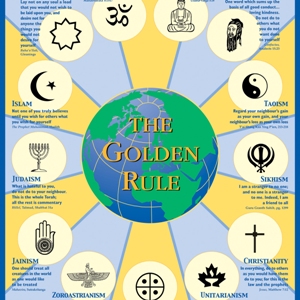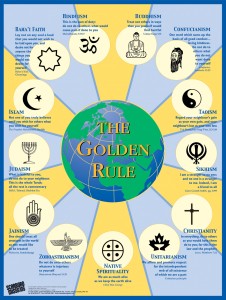The Golden Rule
Or
The Ethic of Reciprocity
“Every religion emphasizes human improvement, love, respect for others, sharing other people’s suffering. On these lines every religion had more or less the same viewpoint and the same goal.”
~ His Holiness the Dalai Lama
Religious groups, as well as non-theistic ethical systems, differ greatly in their beliefs and practices. There is, however, a common thread that runs through them all. Each of these systems of belief has some example of the Ethic of Reciprocity in their teachings. The most common version of this is known as:
The Golden Rule
“Do onto others as you would have them do onto you.”
Here are some examples of other versions of The Golden Rule from various religious or secular teachings:
Ancient Egyptian
“Do for one who may do for you, that you may cause him thus to do.”
~ The Tale of the Eloquent Peasant, 109 – 110 Translated by R.B. Parkinson.
The original dates to 1970 to 1640 BCE and may be the earliest version ever written.
Bahá’í Faith:
“Ascribe not to any soul that which thou wouldst not have ascribed to thee, and say not that which thou doest not.”
~ Baha’u’llah
Brahmanism:
“This is the sum of Dharma [duty]: Do naught unto others which would cause you pain if done to you”.
~ Mahabharata, 5:1517
Buddhism
“Hurt not others in ways that you yourself would find hurtful.”
~ Udana-Varga 5:18
Christianity
“And as ye would that men should do to you, do ye also to them likewise.”
~ Luke 6:31
Confucianism
“Do not do to others what you do not want them to do to you”
~ Analects 15:23
Hinduism
“This is the sum of duty: do not do to others what would cause pain if done to you.”
~ Mahabharata 5:1517
Humanism
“Don’t do things you wouldn’t want to have done to you.”
~ British Humanist Society
Islam
“None of you [truly] believes until he wishes for his brother what he wishes for himself.”
~ Number 13 of Imam “Al-Nawawi’s Forty Hadiths
Jainism
“A man should wander about treating all creatures as he himself would be treated.”
~ Sutrakritanga 1.11.33
Judaism
“What is hateful to you, do not to your fellow man. This is the law: all the rest is commentary.”
~ Talmud, Shabbat 31a
Native American Spirituality
“All things are our relatives; what we do to everything, we do to ourselves. All is really One.”
~ Black Elk
Roman Pagan Religion
“The law imprinted on the hearts of all men is to love the members of society as themselves.”
Shinto
“Be charitable to all beings, love is the representative of God.”
~ Ko-ji-ki Hachiman Kasuga
Sikhism
“Don’t create enmity with anyone as God is within everyone.”
~ Guru Arjan Devji 259
Sufism
“The basis of Sufism is consideration of the hearts and feelings of others. If you haven’t the will to gladden someone’s heart, then at least beware lest you hurt someone’s heart, for on our path, no sin exists but this.”
~ Dr. Javad Nurbakhsh, Master of the Nimatullahi Sufi Order.
Taoism
“Regard your neighbor’s gain as your own gain, and your neighbor’s loss as your own loss.”
~ T’ai Shang Kan Ying P’ien
Unitarian
“We affirm and promote respect for the interdependent web of all existence of which we are a part.”
~ Unitarian principles
Wiccan
“An it harm no one, do what thou wilt”
Yoruba
“One going to take a pointed stick to pinch a baby bird should first try it on himself to feel how it hurts.”
Zoroastrianism
“Whatever is disagreeable to yourself do not do unto others.”
~ Shayast-na-Shayast 13:29
©2008 Humanity Healing. Permission to use with proper credit given.



